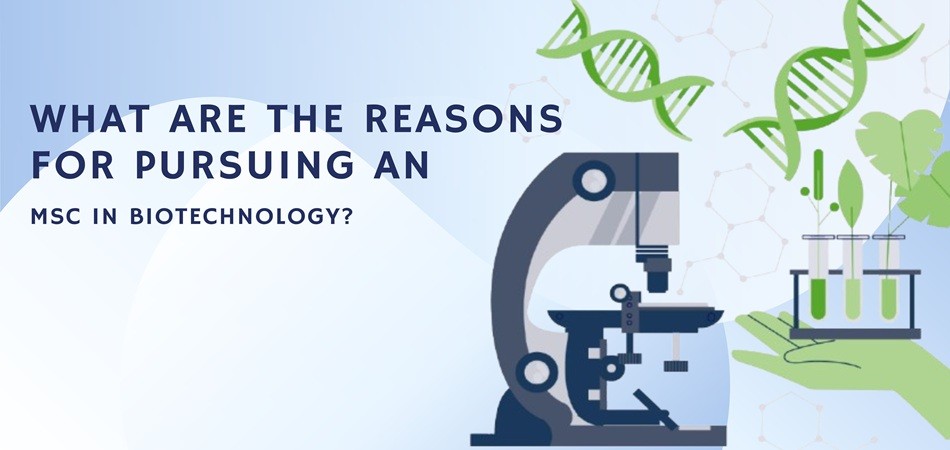What Are the Reasons for Pursuing an MSc in Biotechnology?

Are you fascinated by the intersection of biology and technology? Looking to elevate your scientific career to new heights? An MSc Biotechnology might be your perfect next step to improve your skills. In 2025 and beyond, biotechnology continues to be the driving force behind innovations that once seemed like science fiction.
The Future Is Already Here
Picture farmers growing crops in desert conditions, medical treatments tailored to your unique genetic makeup, and environmental solutions that tackle our planet's most pressing challenges. This isn't tomorrow's world, it's today's biotechnology in action. The MSc biotechnology scope revolves around how we approach healthcare, food production, environmental sustainability, and scientific advancement.
1. You'll Be at the Frontier of Multiple Industries
With an MSc in Biotechnology, you won't be confined to a single career path. Your expertise will be valuable across healthcare, agriculture, environmental science, and even animal husbandry. The transferable skills you develop during your master's program create a dynamic career trajectory where you can pivot between industries as your interests evolve. How many other advanced degrees offer such flexibility?
2. Your Role in Healthcare Could Save Lives
Biotechnology is revolutionizing medicine in ways we couldn't imagine just a decade ago. As an MSc Biotechnology, you could work as a microbiologist identifying new pathogens such as an epidemiologist tracking disease patterns. A biomedical engineer designing life-saving devices, or a research scientist developing next-generation treatments. Each role contributes directly to improving patient outcomes and advancing medical care.
3. You Could Help Feed the Planet Sustainably
Our growing global population needs sustainable food solutions—and biotechnologists are leading the charge. Your master's degree could position you to develop disease-resistant crops, create environmentally friendly biofertilizers, or design new agricultural technologies. Career paths include bioinformatics analyst, agricultural biotechnologist, environmental scientist, formulation engineer, and regulatory specialist—all working toward the common goal of sustainable food production.
4. Research & Development Needs Your Creativity
Are you driven to discover the new and unexplored? R&D in biotechnology offers the perfect outlet for scientific creativity. With your advanced degree, you could design and test biological products, research novel drug candidates, or develop gene therapies for treating disease. Your work in R&D lays the groundwork for innovations that eventually reach markets and change lives.
5. You'll Bridge the Gap Between Science and Products
Product development transforms scientific discoveries into real-world solutions. Your role might involve optimizing manufacturing processes, conducting safety and efficacy tests, and preparing innovations for regulatory approval. This bridge between laboratory and marketplace requires scientific knowledge and practical application precisely what an MSc in Biotechnology provides.
6. Quality Control Ensures Safe and Effective Products
In an industry where products directly impact human health and environmental safety, quality assurance is paramount. Your advanced training prepares you to develop quality control procedures, monitor product safety, and conduct regulatory compliance audits. This critical role ensures that biotechnology products meet the highest standards before reaching consumers.
7. Your Expertise has Regulatory Complexities
The path from laboratory to market involves navigating complex regulatory requirements across different countries and regions. With an MSc in Biotechnology, you'll understand how to develop and submit product applications to regulatory authorities, manage approval processes, and ensure ongoing compliance with evolving standards. This specialized knowledge is increasingly valuable as biotechnology products face heightened scrutiny.
8. Data Analysis Skills Open Doors in Bioinformatics
The biotechnology revolution generates massive amounts of biological data requiring sophisticated analysis. Your master's training in bioinformatics using computational methods to analyze genetic and genomic information positions you at the intersection of biology and computer science. You might develop algorithms, create databases, or apply artificial intelligence to extract meaningful insights from complex biological data.
The Biotechnology Horizon
The biotechnology field continues to evolve at a breathtaking pace. Emerging trends include personalized medicine tailored to individual genetic profiles, artificial intelligence applications in drug discovery, and innovative biotechnology solutions for sustainable food production.
A Master in Biotechnology will lead the way in developing solutions that improve health, protect our environment, and address global challenges through the power of science.
Seeking MSc Biotechnology Colleges in Delhi as your next step toward a future at the forefront of scientific innovation? Connect with
Ganesh Paramedical College for highly-equipped biotechnology courses according to UGC accreditation.

